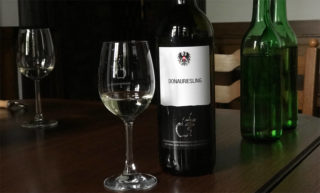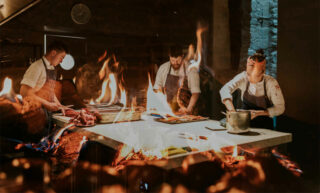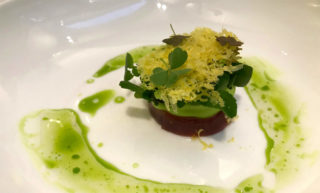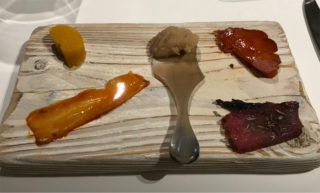Challenging Conservatism
In an arts-obsessed city like Vienna, the Wiener Festwochen, the city’s premier cultural festival, carries a lot of weight – something that its new head and artistic director, Christophe Slagmuylder, is quite aware of. When asked what the Festwochen, which have taken place since 1951, should look like at the end of his term in 2024, he cheerfully replied, “I want the spectators to tell me the performances are not challenging enough. I hope they’ll be more daring than I am.” Indeed, the tendency of today’s cutting edge to be tomorrow’s establishment was a recurring theme throughout our conversation at the Champagne bar Le Moët at the Le Méridien Hotel at the Opernring.
Born into a bilingual (French and Flemish), middle-class family in Brussels in 1967, Slagmuylder wasn’t predestined for a career in the arts. His father, a pharmacist, considered art “unproductive,” and “not a job.” At home there weren’t any books, neither were his parents politically engaged. Nonetheless, the young, introverted Christophe found inspiration in books, movies and exhibitions and was encouraged by one of his schoolteachers to disregard the crowd and find his own way. Education is still close to his heart. “It can be life changing.”
After obtaining a degree in contemporary arts at his local university, Slagmuylder did a stint as an arts teacher. Initially fascinated by the visual arts and European filmmakers of the ’60s and ’70s like Antonioni, Fassbinder and Rossellini, his interests later shifted toward the performing arts – or “live” arts as he calls it – when he started working as an assistant to several dance companies. In 2002, he joined the Kunstenfestivaldesarts (KFDA) in Brussels, which he eventually headed for 12 years.
Now in Vienna, he was initially appointed the interim artistic director for this year’s Festwochen, but Slagmuylder subsequently won the selection procedure to fill the position until 2024.
FRESH WIND
Although careful not to offend anyone, it’s clear that Slagmuylder wants to open the windows and let some fresh air into Vienna’s cultural scene. His first impression of the city is that, unlike Brussels, a home to many different groups where everyone can be a “Brusselaar,” Vienna seems more “monocultural,” making it much harder to be considered Viennese. Likewise, preconceptions of what constitutes an opera, a play or a concert are quite rigid here. Habits and expectations still seem to be deeply engrained.
As a result, the Wiener Festwochen 2019 “strives to be an antidote to any reflex of conservatism,” Slagmuylder says in the preface to this year’s program. “However,” he adds, “one’s roots are important. It’s a human reaction to protect what you have. This isn’t negative; it’s a reflex, but not always a good one. In the fast-paced times we live in, the reflex to try to preserve what we have is understandable, but we risk being afraid of the new and unexpected.”
In the early 20th century, Vienna was at the cultural vanguard. While acknowledging that legacy, Slagmuylder thinks the city “could be more open and aware of the epoque we’re living in.” Given that Vienna is relatively progressive within Austria, Slagmuylder might be preaching to the choir. Nonetheless, the first reactions to his plans have not only generated excitement, but also raised eyebrows.
Traditions aren’t lost upon Slagmuylder, but when you scratch the surface of the music program, you’ll see venerable compositions given a new lease on life: In Marcelo Evelin’s Matadouro, a live performance of Schubert’s Quintet in C Major will clash with the ritual rhythms of eight actors, while dancer Anne Teresa De Keersmaekers is presenting her latest choreography based on Bach’s Brandenburg Concertos accompanied by the B’Rock Orchestra, a Belgian ensemble known for merging the old with the new.
THE CLASSICS & THE CONTEMPORARY
Slagmuylder’s program also features artists who draw on antiquity for inspiration, like Milo Rau with his Orest in Mossul (based on the Oresteia by Aeschylus) and Marlene Monteiro Freitas’ Bacantes (Euripides’ Bacchae). The Greek tragedies, with their focus on the fundamental matters of life and death, remain timeless, after all.
Referring back to the classics didn’t happen by chance, but wasn’t planned either, which is characteristic for Slagmuylder’s modus operandi: His programs grow organically, with themes emerging as the planning process develops. “I am not a very conceptual guy. I need the ground. I think while I’m doing.” It is in his interactions with artists, theaters and local authorities that the program takes shape. Although he strives to reach a wider audience, his uncompromising ambition for the Festwochen is to be – and remain – challenging.
Slagmuylder is politically engaged and likes to place things in a contemporary context. “Art should be a part of society,” he says. “It shouldn’t live in its own bubble. It should connect with the world, but without losing its autonomy. Art can’t solve things, but it does have its responsibilities. It can ask questions, it can help society to move, develop and shift.”
Digging deeper into the program, you’ll see that many performances will compel the spectator to consider political and societal developments. In Proces by Polish theater director Krystian Lupa, Kafka’s the Trial provides a base for questioning how the current, ultra-conservative Polish government is purging the judicial system of supposed enemies while Markus Örhn’s 3 Episodes of Life revolves around violence and abuse in the workplace, an allusion to the recent #metoo movement.
Still, art may also be “useless,” Slagmuylder says and then nuances it: “It may seemingly not have a function.” I suggest that, as in science, artists need the freedom to experiment with the notion that a false or unexpected outcome can also be a good result. Slagmuylder agrees with the analogy.
CITYWIDE CULTURE
As a way to present a true city festival, performances will take place in 11 districts, in venues as diverse as the Odeon (2.), the Gösserhallen (10.), Volkstheater (7.), Theater an der Wien (6.) and Theater Akzent (4.). The grand opening production, Diamante by Mariano Penso , will be staged in the Erste Bank Arena in Donaustadt, a large outer district with many Neue Wiener but very few cultural offerings. In the three-part play, the audience literally moves past three stages in the transformation of the fictitious early 20th-century town of Diamante in Argentina: Founded by German settlers, the new immigrants build up their new environment and their lives, but over time, the dynamism of the new gives way to a horrifically static stagnation. With recurring themes like migration, growth, identity, conservatism and protectionism, the parallel to Donaustadt, the youngest district of a fast-growing city, is not entirely coincidental.
Detailed plans for the Festwochen beyond this year are not yet available, but Slagmuylder likes to emphasize that he wants the festival to provide a framework where artists can create something they otherwise couldn’t. “I want it to be a festival of creation.” Asked if such challenging programs could also be spread out over an entire season, Slagmuylder emphasizes the advantages of the festival format: Although visiting just one performance can be a valuable experience, attending several shows within a time frame of six weeks allows for more intensity, resonance and context, enabling spectators to connect seemingly different things.
At the Festwochen Bar, which will move from Donaustadt to the Volkstheater and eventually on to the Gösserhallen, viewers can exchange notes on what they have experienced, attend lectures or just party. As Slagmuylder himself often passes through different phases of understanding a work, it may be challenging, but it will also tickle your curiosity and open new windows. Who knows: In five years you could be more daring than Slagmuylder.
Wiener Festwochen: 9 May – 19 June 2019
CHRISTOPHER SLAGMUYDER’s 3 TIPS:
Missing People
by Béla Tarr
June 12, 21:00h & June 13-16, 18:00h & 21:00h
MQ Halle E
Museumsplatz 1 (7. Bezirk)
Diamante
by Mariano Pensotti/ Gruppo Marea
May 11-19 except 13 & 17, 18:00h
Erste Bank Arena
Attemsgasse 1 (22. Bezirk)
Proces
by Krystian Lupa
May 19-21, 18:30
MQ Halle E
Museumsplatz 1 (7. Bezirk)
A slightly altered version of this article was published in Metropole – Vienna in English, March 2019 issue no. 34.




Comments